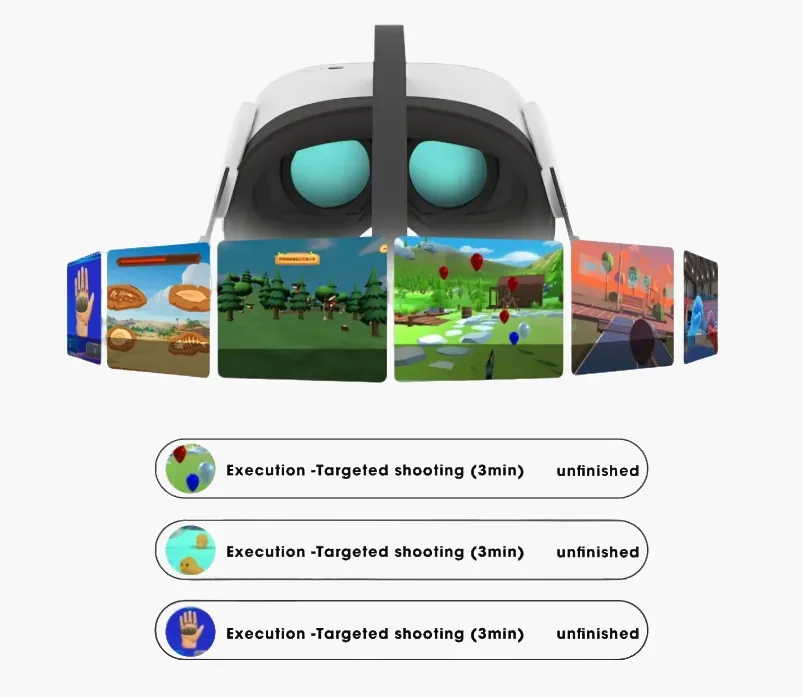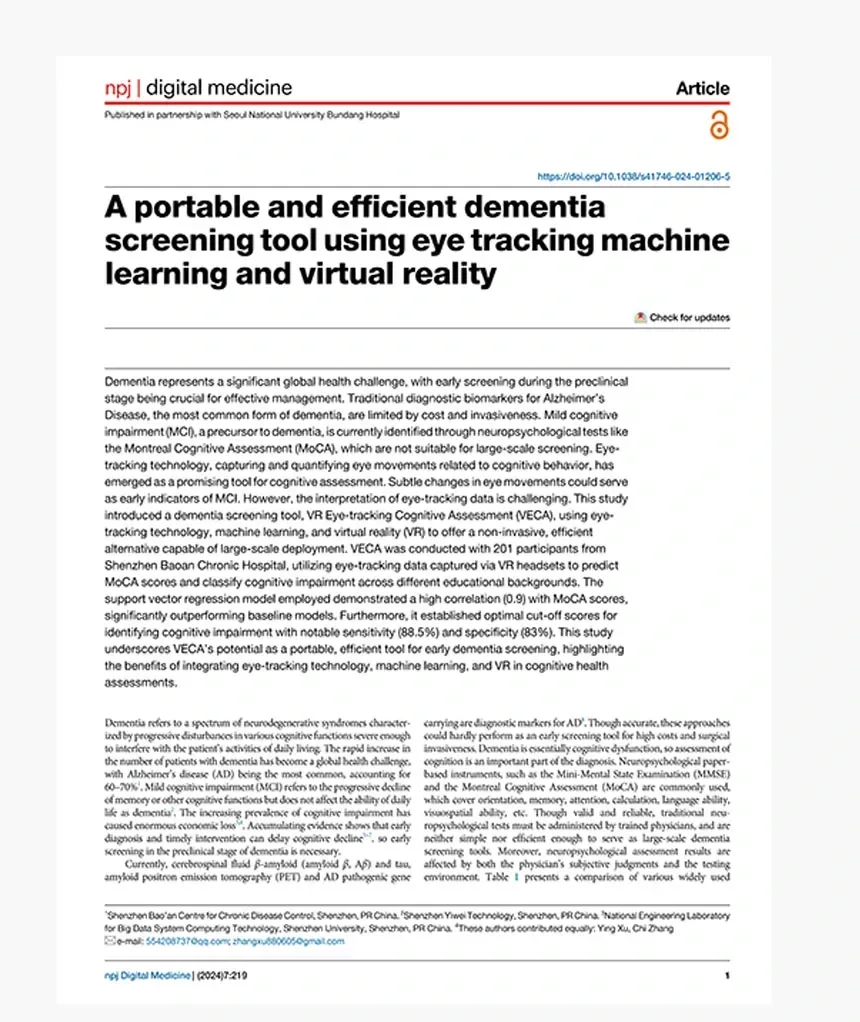
Emerging examinations proposes that interactive virtual spaces therapy can markedly elevate the states of subjects living with neurodegenerative disorders. By conveying them to quiet atmospheres, VR furnishes a innovative option for thought encouragement, sentimental adjustment, and social interaction. A variety of inquiries have confirmed that VR therapy can lower uneasiness, anxiety, and despondency in dementia subjects while also strengthening their recall, mindfulness, and verbal abilities.
- VR permits individuals with dementia to recollect valued experiences through interactive animations.
- Also, it can grant a secure and caring space for relational participation, enhancing a impression of association and affiliation.
- Investigators consider that VR therapy has the promise to revolutionize dementia support by contributing new and novel strategies to resolve the complicated problems faced by users living with this disorder.
Tech-Driven Cognitive Therapies for Alzheimer's Patients
Growing online therapeutics are demonstrating potential in the realm of mind sharpening for clients experiencing Alzheimer's disorder. These interfaces tap into automated tools to improve brain activity and theoretically mitigate the spread of the disorder. Motivating activities, personalized guidance, and neuropsychological training are some models of methods being studied in this emerging domain. While examinations are progressing, digital therapeutics offer a supportive option for augmenting the well-being of those suffering from Alzheimer's disease.Digital Terrain Exploration in Alzheimer's Disease Management
For participants suffering from cognitive Alzheimer's ailment, the continuous loss of mind function and mental skills can substantially compromise their facility to associate with the world around them. This damaging syndrome often generates in detachment, displeasure, and a weakened ego recognition. Current developments in virtual reality technology offer a groundbreaking prospect to address these challenges by establishing immersive experiences that can activate the brain and renew cognitive function.
Virtual reality landscapes crafted specifically for Alzheimer's clients can send them in beloved venues, such as their juvenile habitat or a popular natural site, stirring positive memories and lowering anxiety. Through interactive tasks, these virtual scapes can also engage cognitive abilities like memory, mindfulness, and problem-solving.
The potential benefits of virtual reality in Alzheimer's therapy are substantial. Early examinations have established optimistic results, with participants demonstrating improvements in cognitive performance, mood, and overall quality of life. As this technology proceeds, it holds the key to revolutionizing the way we approach Alzheimer's disease, providing a new pathway for intervention and strengthening.
Digital Memory Therapy for Alzheimer's Disease
Reminiscence therapy is a well-respected technique used to advance cognitive function and affective health in individuals with Alzheimer's disease. This conventional form of therapy involves encouraging patients to share past experiences, often through talks. However, a pioneering approach is emerging: VR-mediated reminiscence therapy.
This immersive tool utilizes virtual reality headsets to transfer patients in faithful environments that recall memories from their past. By experiencing these man-made contexts, individuals with Alzheimer's can associate with their past in a influential way.
The Potential of Virtual Reality to Improve Memory and Cognition in Dementia
Virtual reality (VR) is emerging as a novel device in the fight against dementia, presenting trailblazing ways to energize memory and cognition. By designing immersive worlds, VR can enable individuals with dementia recover memories, take part in meaningful activities, and enhance cognitive functions. Studies have demonstrated that VR interventions can lead to important improvements in memory recall, attention, and dimensional awareness. Moreover, VR provides a harmless and uplifting space for individuals with dementia to explore, reducing feelings of isolation and unease.
- Also, VR can be adapted to individual needs and preferences, enabling heightened levels of connection.
- Considering the potentials of VR, ongoing research is needed to fully understand its long-term benefits in dementia care.
Renewing Memories, Enhancing Relationships: VR for Alzheimer's Social Health
Digital augmented spaces is emerging as a revolutionary solution in the field of cognitive disorders. By producing immersive and social atmospheres, VR has the ability to spark memories, promote social interaction, and enhance the overall quality of life for subjects affected by Alzheimer's. Notably a key impressive aspects of VR is its ability to transfer users to familiar venues and experiences from their past. Whether it's a visit to a childhood home or a Alzheimer’s disease reenactment of a beloved holiday, these virtual escapades can invoke happy memories and enhance cognitive faculties. Furthermore, VR can promote social interaction by associating individuals with others who share similar pastimes. This can be particularly profitable for people with Alzheimer's who may deal with hardship with traditional social connection. By hosting a safe and interesting virtual space, VR can minimize feelings of isolation and loneliness, which are common among persons affected by Alzheimer's. Overall, VR holds immense potential for improving the lives of subjects with Alzheimer's by reawakening memories, fortifying connections, and enhancing their quality of life. As technology advances to develop, we can expect even more groundbreaking applications of VR in the field of dementia care.Gamifying Cognitive Training: Using VR to Manage Alzheimer's Conditions
VR technology is rapidly emerging as a state-of-the-art tool in the realm of cognitive training, particularly for clients experiencing Alzheimer's disease. By immersing patients in interactive and engaging virtual environments, VR-based interventions can activate cognitive functions such as memory, attention, and problem-solving. These games commonly incorporate elements of storytelling, exploration, and social interaction, making the training process deeply involving. Studies have shown that VR-based cognitive training can lead to substantial improvements in cognitive performance, supposedly delaying the progression of Alzheimer's symptoms. Moreover, VR provides a safe and controlled environment for patients to practice new skills and enhance their confidence.
- Game-enhanced procedures in VR training can make it very enjoyable and involving for people with mental challenges.
- VR simulations can offer believable scenarios that drive and improve cognitive functions.
- Personalized VR experiences can cater to distinct expectations and habits.
Using Simulated Worlds to Aid Dementia Care
Captivating artificial domains offer a modern and beneficial avenue for individuals living with dementia. These platforms can transport familiar environments, allowing those affected by cognitive decline to immerse in cherished memories and develop a sense of consolation. By alleviating the symptoms of dementia, VR platforms have the capability to advance quality of life for both users and their guardians.
- Studies indicate that VR strategies can effectively impact cognitive function, affective well-being, and even neuromuscular abilities in individuals with dementia.
- Moreover, VR furnishes a safe and organized environment for examination, reducing the risk of harm.
- Furthermore, VR can promote social interactions by allowing individuals with dementia to collaborate in augmented activities with others.
Utilizing Virtual Reality for Early Alzheimer's Identification and Management
Alzheimer syndrome shows a multifaceted challenge, often continuing unnoticed in its early stages. However, virtual reality (VR) is materializing as a groundbreaking tool for primary detection. Through immersive platforms, VR can analyze cognitive abilities in ways that traditional methods are inadequate to. This prospect allows for immediate action strategies, potentially impeding disease progression and enhancing the quality of life for persons with Alzheimer's.
- VR systems measure cognitive responses such as memory and spatial awareness within controlled environments.
- Personal VR platforms promote user engagement in cognitive enhancement practices.
- Computer-generated spaces provide social conditions for Alzheimer's clients to bond and mingle.
Facilitating Dementia Communication and Interaction Through VR
{In the realm of dementia care, innovative technologies are emerging to supplement the lives of subjects facing dementia challenges. Virtual reality (VR) is one such system that holds immense power for closing social and communicative divides common in dementia patients. By providing enthralling virtual settings, VR can engage cognitive function, reduce behavioral issues, and ultimately improve the overall well-being of people living with dementia.
VR experiences designed for neurodegenerative disease management can range from nostalgia therapy sessions that bring individuals into past familiar contexts, to interactive games that promote social interaction and cognitive training. Furthermore, VR has the competence to connect subjects affected by dementia with companions, regardless of physical separation, fostering a sense of acceptance.
- VR can help in reducing agitation and anxiety by providing a calming and captivating environment.
- Research have shown that VR interventions can lead to improvements in cognitive function, mood, and social interaction in users diagnosed with dementia.
- As technology continues to advance, we can expect even more innovative and {effective|beneficial|helpful|powerful|impactful|successful|productive|efficient
